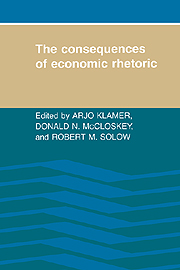Book contents
- Frontmatter
- Contents
- Preface
- The consequences of economic rhetoric
- PART I ECONOMIC RHETORIC: INTRODUCTION AND COMMENTS
- PART II ECONOMIC RHETORIC: FURTHER ARGUMENTS
- 5 Marxian theory and the rhetorics of economics
- 6 Economic rhetoric: The social and historical context
- 7 The ideas of economists
- 8 Should a scientist abstain from metaphor?
- PART III ECONOMIC RHETORIC AMONG ECONOMISTS
- PART IV ECONOMIC RHETORIC IN POLITICS AND JOURNALISM
- PART V ECONOMIC RHETORIC: ITS RHETORIC AND ITS CONSEQUENCES
- 1 Appendix: Other contributors and participants
- Index
7 - The ideas of economists
Published online by Cambridge University Press: 07 September 2010
- Frontmatter
- Contents
- Preface
- The consequences of economic rhetoric
- PART I ECONOMIC RHETORIC: INTRODUCTION AND COMMENTS
- PART II ECONOMIC RHETORIC: FURTHER ARGUMENTS
- 5 Marxian theory and the rhetorics of economics
- 6 Economic rhetoric: The social and historical context
- 7 The ideas of economists
- 8 Should a scientist abstain from metaphor?
- PART III ECONOMIC RHETORIC AMONG ECONOMISTS
- PART IV ECONOMIC RHETORIC IN POLITICS AND JOURNALISM
- PART V ECONOMIC RHETORIC: ITS RHETORIC AND ITS CONSEQUENCES
- 1 Appendix: Other contributors and participants
- Index
Summary
In the concluding chapter of his engaging Conversations with Economists, Arjo Klamer (1984) aptly summarizes the flavor of the answers elicited by his questioning:
Economists do not only construct models and conduct empirical tests, they also argue on what a good model should look like. Moreover, they philosophize, appeal to common sense, and talk about other economists and their work. Economics involves the art of persuasion. In the absence of uniform standards and clearcut empirical tests, economists have to rely on judgments, and they argue to render their judgments persuasive. This process leaves room for nonrational elements, such as personal commitment and style, and social discipline.
This description conveys a picture of “scientific” economics quite different from Milton Friedman's 1953 essay on “The Methodology of Positive Economics,” but it accords well with the portrait of physical science suggested by Hanson's 1958 Patterns of Discovery. My impression is that the Friedmanian view – sometimes construed in ways that Professor Friedman probably would be loath to accept – played an unhealthily prominent role in economics throughout most of the past quarter-century. As the present conference suggests, the influence of that view now appears to be waning and seems likely before long to be replaced by the more relaxed and nondoctrinaire views endorsed by McCloskey, Klamer, and other modern students of “the rhetoric of economics.”
The essay reprinted here is in some respects a precursor of recent work by McCloskey and Klamer, but it was conceived as a natural offshoot of “revisionist” accounts of the history of physical science by Hanson (1958), Kuhn (1962), and others.
- Type
- Chapter
- Information
- The Consequences of Economic Rhetoric , pp. 85 - 99Publisher: Cambridge University PressPrint publication year: 1989



